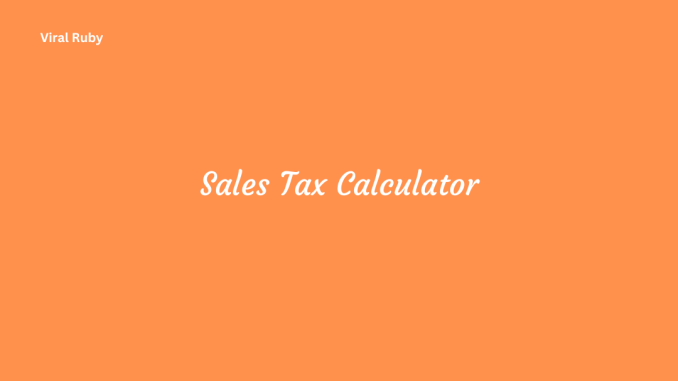
What is Sales Tax Calculator?
A Sales Tax Calculator is a tool used to determine the amount of sales tax that should be added to the price of a product or service. Sales tax is a percentage-based fee imposed by governments on the sale of goods and services, and it’s typically collected by the seller at the point of sale. The calculator takes the original price of the item and the applicable sales tax rate into account to provide the final total that a customer would need to pay, including the tax.
For example, if the original price of an item is $100 and the sales tax rate is 8%, the calculator would compute the sales tax as $100 * 0.08 = $8. The final total that the customer would pay, including the tax, would then be $100 + $8 = $108.
Sales tax rates can vary by location and the type of goods or services being sold. Some areas may have different tax rates for specific items, exemptions for certain products, or even no sales tax at all. A sales tax calculator helps individuals, businesses, and retailers quickly determine the correct amount of sales tax to be added to a transaction, ensuring accurate pricing and adherence to tax regulations.
Importance of Sales Tax Calculator
Accurate Calculations: Sales tax rates can vary significantly between different regions, states, or countries. Utilizing a sales tax calculator ensures precise calculations, preventing errors that might arise from manual calculations and guaranteeing the correct amount is charged or paid.
Compliance with Tax Laws: For businesses, accurately calculating and collecting the appropriate amount of sales tax is crucial to comply with tax regulations. Failure to do so can result in legal consequences, fines, or penalties.
Transparent Transactions: In both personal and business transactions, transparency is vital. Providing customers with a clear breakdown of the sales price and the applicable sales tax fosters trust and transparency in the exchange, leading to positive customer experiences.
Budgeting and Planning: Individuals can use sales tax calculators to plan their budgets effectively. When making purchases, they can factor in the sales tax to better manage their finances and avoid overspending.
Online Shopping: With the rise of e-commerce, people often purchase items from different states or countries. Each jurisdiction may have its own sales tax rates. A sales tax calculator helps online shoppers accurately estimate the total cost of their purchase, including taxes.
Business Operations: For businesses, keeping accurate records of sales tax collected is crucial for financial reporting and tax filing purposes. A sales tax calculator aids in maintaining accurate records and streamlining accounting processes.
Avoiding Under/Overpayment: Incorrectly calculating sales tax can lead to either underpayment, resulting in lost revenue for businesses, or overpayment, causing customers to pay more than required. A calculator mitigates such issues.
Educational Purposes: Sales tax calculators can serve as educational tools. They help individuals understand the concept of sales tax and how it affects their transactions, promoting financial literacy.
Efficiency and Time Savings: Manual calculations can be time-consuming and prone to mistakes. Sales tax calculators automate the process, saving time and reducing the risk of errors.
Cross-Border Transactions: Businesses engaged in international trade must navigate varying tax rates and regulations. A sales tax calculator aids in determining the correct taxes to be charged or paid, facilitating smooth cross-border transactions.
Purpose of Sales Tax Calculator
Accurate Calculations: Sales tax rates can vary widely depending on the location and type of goods or services being sold. A sales tax calculator ensures precise calculations, preventing errors that might arise from manual computations and ensuring the correct amount of tax is applied.
Ease of Use: Sales tax calculators are designed to be user-friendly, requiring minimal input from the user. This accessibility makes it convenient for both individuals and businesses to quickly determine the accurate sales tax amount.
Transparent Transactions: For both buyers and sellers, transparent transactions are crucial. By providing a clear breakdown of the sales price and the associated sales tax, the calculator promotes transparency and helps build trust in the transaction.
Compliance with Tax Laws: Businesses are legally obligated to collect the correct amount of sales tax and remit it to the appropriate tax authorities. Utilizing a sales tax calculator ensures compliance with tax laws, avoiding potential legal issues and penalties.
Budget Planning: Individuals can use sales tax calculators to better plan their budgets when making purchases. By knowing the total cost, including taxes, they can make informed spending decisions.
Online Shopping: In the era of online shopping and e-commerce, people often buy products from various jurisdictions with differing tax rates. Sales tax calculators enable online shoppers to estimate the overall cost accurately, considering the applicable taxes.
Efficiency and Accuracy: Manual calculations can be time-consuming and prone to mistakes. Sales tax calculators streamline the process, saving time and minimizing the risk of errors in calculations.
Record Keeping: For businesses, accurate record keeping is essential for financial management and tax reporting. Sales tax calculators assist in maintaining accurate records of sales tax collected for accounting and reporting purposes.
Cross-Border Transactions: Businesses engaged in international trade must navigate the complexities of varying tax rates in different regions or countries. A sales tax calculator helps them determine the correct taxes to apply, facilitating cross-border transactions.
Educational Tool: Sales tax calculators can also serve as educational tools. They help users understand how sales tax works and how it impacts their financial transactions, contributing to increased financial literacy.
Future of Sales Tax Calculator
Automation and Integration: Sales tax calculators will become more integrated with various digital platforms and systems. They might be embedded into e-commerce websites, point-of-sale (POS) systems, and mobile apps, providing real-time tax calculations and seamless shopping experiences.
AI and Machine Learning: Advanced algorithms could be incorporated into sales tax calculators, allowing them to predict changes in tax rates and adapt to dynamic tax environments. AI-powered systems might also identify patterns in tax data and offer personalized recommendations to businesses.
Geo-Fencing and Location Tracking: As consumers increasingly shop using mobile devices, sales tax calculators could use geo-fencing and location tracking technologies to accurately determine the applicable tax rates based on the shopper’s physical location.
Real-Time Updates: Sales tax rates can change frequently due to legislative updates. Future calculators might receive real-time updates from tax authorities, ensuring accuracy and compliance with the latest regulations.
Global Commerce Solutions: With the growth of international e-commerce, sales tax calculators might evolve to handle complex cross-border transactions, considering different tax jurisdictions, currency conversions, and import/export regulations.
Blockchain and Cryptocurrencies: As cryptocurrencies gain traction in commerce, sales tax calculators might integrate blockchain technology to automatically calculate and record tax liabilities associated with cryptocurrency transactions.
Personalized Experiences: Sales tax calculators could provide personalized experiences by considering a shopper’s tax-exempt status, loyalty memberships, or other factors that influence tax applicability.
Data Analytics: Businesses could utilize sales tax calculator data for analytics, helping them gain insights into customer behavior, spending patterns, and regional preferences.
Sustainability and Ethics: Future sales tax calculators might also incorporate information about eco-friendly or socially responsible products, allowing consumers to make informed choices based on their values.
Regulatory Changes: Changes in tax laws and regulations will continue to impact the development of sales tax calculators. These tools will need to adapt to new compliance requirements, such as the collection of digital sales taxes.
Accessibility and Inclusivity: Future sales tax calculators should be designed with accessibility in mind, catering to users with disabilities and ensuring that everyone can easily and accurately calculate sales tax.
Education and Empowerment: Sales tax calculators may play a role in promoting financial literacy and educating users about tax concepts, helping them better understand the implications of sales tax on their transactions
Example of Sales Tax Calculator
Let’s say you’re an individual purchasing a gadget online. The gadget costs $500, and the applicable sales tax rate in your region is 8%.
You input the price of the gadget: $500
You select the sales tax rate for your region: 8%
The sales tax calculator then performs the following calculation:
Sales Tax Amount = Price of Gadget × Sales Tax Rate
Sales Tax Amount = $500 × 0.08 = $40
The calculator displays the results:
Price of Gadget: $500
Sales Tax Rate: 8%
Sales Tax Amount: $40
Total Cost = Price of Gadget + Sales Tax Amount
Total Cost = $500 + $40 = $540
So, the total cost of the gadget including the sales tax is $540.
In this example, the sales tax calculator accurately calculates the sales tax amount based on the provided price of the gadget and the applicable sales tax rate. It then adds the sales tax to the original price to determine the total cost of the purchase. This helps you make informed financial decisions and understand the complete cost of your transaction

Leave a Reply